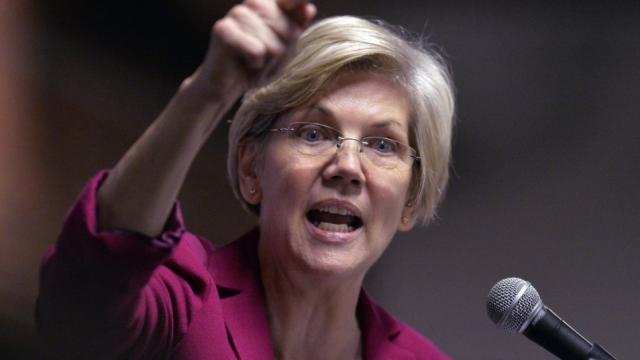
On Tuesday, Sen. Elizabeth Warren (D-MA) headlined an event that launched a new coalition calling itself “Take On Wall Street.”
The group includes lawmakers like Warren, Reps. Keith Ellison (D-MN) and Nydia Velazquez (D-NY), labor leaders like the AFL-CIO’s Richard Trumka and the AFT’s Randi Weingarten, as well as civil rights groups, community groups, and the organizing giant Move On. It aims to put pressure on lawmakers at all levels to pass stricter rules governing the financial system.
Operating on two principles — “No cheating, and no pushing the risks on taxpayers,” as Warren put it — it’s making five key demands: breaking up the biggest banks; ensuring access to non-predatory banking products, including through the United States Post Office; ending the carried interest tax loophole that allows hedge fund managers to use a tax break for investment income on the income they make at work; reining in executive bonuses; and imposing a financial transaction tax.
In her remarks, Warren noted some of the accomplishments that have been achieved under the 2010 Dodd-Frank financial reform bill, particularly the $10.1 billion in consumer relief brought about by the Consumer Financial Protection Bureau. But she argued that things have to go further. “We have made a lot of progress under the Dodd-Frank financial reforms,” she said. “But we’ve also got a lot more to do.”
In particular, she called for a reinstatement of a “21st century Glass-Stegall,” a law that previously separated riskier investment banking activities from commercial deposits, and to “break up the big banks.” Given that banks have grown larger and more concentrated since the financial crisis, she warned that taxpayers are still not free from the possibility of having to bail them out again in the future. “Dodd-Frank imposed some discipline, but let’s get real,” she said. “Dodd-Frank did not end too big to fail.”
She also called to “stitch up some tax loopholes,” including the favorable treatment for carried interest earned by hedge fund managers and for executives’ bonuses that are handed out even if the institutions they oversee fail. And she called for the creation of a financial transaction tax targeting high-frequency traders to stabilize markets while also drawing in more government revenue.
“These changes will make our financial markets stronger and healthier, and give working families a fighting chance to build a real future for themselves and for their children,” Warren said.
The point of the new coalition, however, is not just to lay out a policy agenda, but to combine firepower in hopes of getting it passed. It will target Congressional action, fights at the city and state level, as well as a push to include the proposals in the Democratic Party platform at the convention in July.
“Let’s face it, this will not be an easy fight,” Warren said, pointing to the resources and connections that banks can wield. “But we didn’t take on this fight because it’s easy, we took on this fight because it’s right… If we fight shoulder to shoulder we will win.”
Ellison elaborated on what that might look like. “We are going to use our democratic prerogative to make the high and mighty on Wall Street obey our interests,” he said. “We need a resurgence in democratic participation. We need a resurgence of activism.” That could include, he said, marching, arrests, conversations with neighbors, and getting involved in “writing the rules.”
“We are the many and they are the money,” he said. “We are going to win this fight if we stick to it.”
3 WAYS TO SHOW YOUR SUPPORT
- Log in to post comments











